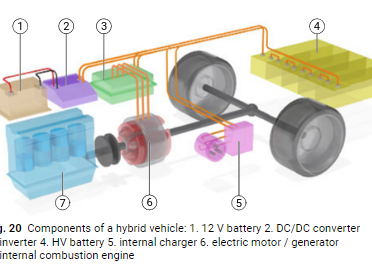(WACO, Texas) – Hybrid and electric vehicles are becoming more prominent in the automotive and diesel equipment industries, and Texas State Technical College’s Automotive Technology and Diesel Equipment Technology programs have partnered to create a training class that will prepare students for that reality.
Thomas Breshears, statewide department chair for TSTC’s Diesel Equipment Technology program, said many manufacturers have the goal to be emission-free by 2035.
“There’s so many electric vehicles,” he said. “With Europe doing away with emission vehicles, they’re trying to be emission-free by 2035. All the manufacturers out there have similar goals.”
Because of this rise in hybrid and electric vehicles, training that is specifically designed to teach students how to maintain them is also necessary.
“We’re wanting to prepare the students because these electric vehicles and hybrid vehicles are on the road today, whether it’s light-duty vehicles, whether we’re talking about semitrucks or pieces of equipment,” he said. “We’re trying to give all the students who go through our program at least a fundamental knowledge of these electric vehicles and also safety working around them.”
Bradley Hayes, lead instructor for the Diesel Equipment Technology program at TSTC’s Marshall campus, echoed the statement.
“In order to keep up with the industry, we felt it was necessary for us to at least introduce hybrid and electric vehicle technology to our students,” he said. “It’s sort of an entry, but it’s right there with the most current technology in the industry.”
Breshears said there has become such a prevalent need in the industry that they have already had employers approach them and ask if TSTC students would be prepared to work around hybrid and electric vehicles.
“They’re concerned with having technicians that are trying to work around them,” he said. “It’s not necessarily working on them, but around them because, you know, the electric vehicle is the same as a regular vehicle, other than the fact that it’s got the electrical propulsion system.”
Hayes emphasized the safety aspect of working around hybrid or electric vehicles when talking about the training.
“We feel the safety involved in the training is critically important. Because if a student goes into the workforce and encounters this type of equipment, the voltages involved are extremely dangerous,” he said. “That is the reason for us introducing it now, to make sure that our students have that preparation. Because with current trends, it will absolutely be something they deal with in their career.”
Hayes said he felt it was important for people to know that the diesel equipment and automotive industries have evolved to meet modern technology.
“I think the important thing for people to understand about the Diesel Equipment Technology program is not our idea of what an automotive or a heavy diesel technician used to be,” he said. “Modern equipment is operated by modern electronics. So is there oil and grease and dirty things involved? There are. But there are also laptops, electronic communication between computer modules, lots of sensors, and very good sophisticated communication and information systems. And students who want a career in this field need to be ready to embrace all of it.”
Diesel Equipment Technology program students who begin in the fall will be the first to go through the training. The training will take place during their third semester.
The Automotive Technology program plans to implement the training the following fall semester.
Marshall’s Diesel Equipment Technology program will implement the program at a later date to allow adaptations to the training for hybrid and electric off-road vehicles.
Breshears said they also plan to offer the training as a part of TSTC’s workforce training, allowing companies to send employees to upgrade their skills.
For more information on TSTC, go to tstc.edu.
